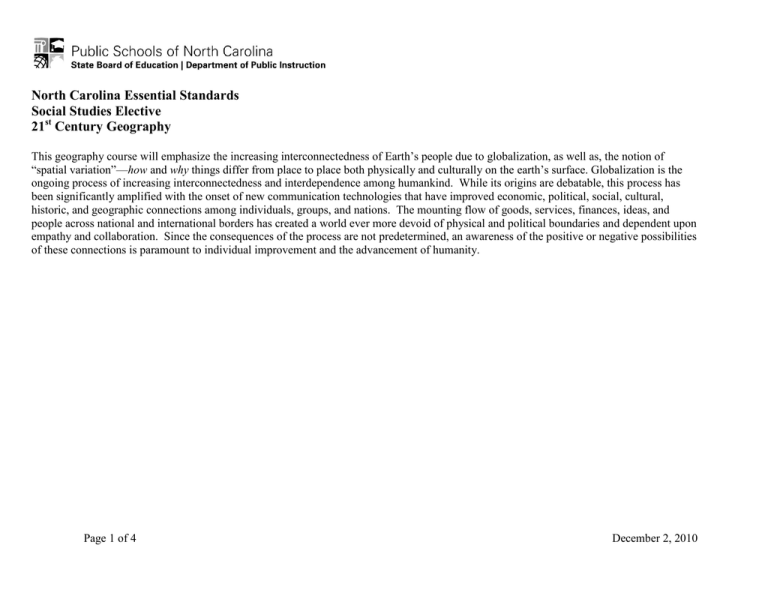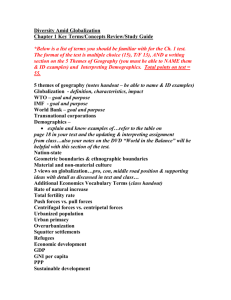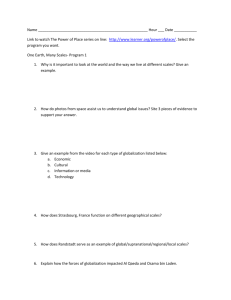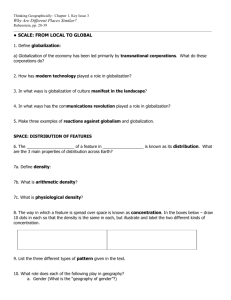North Carolina Essential Standards Social Studies Elective 21 Century Geography
advertisement

North Carolina Essential Standards Social Studies Elective 21st Century Geography This geography course will emphasize the increasing interconnectedness of Earth’s people due to globalization, as well as, the notion of “spatial variation”—how and why things differ from place to place both physically and culturally on the earth’s surface. Globalization is the ongoing process of increasing interconnectedness and interdependence among humankind. While its origins are debatable, this process has been significantly amplified with the onset of new communication technologies that have improved economic, political, social, cultural, historic, and geographic connections among individuals, groups, and nations. The mounting flow of goods, services, finances, ideas, and people across national and international borders has created a world ever more devoid of physical and political boundaries and dependent upon empathy and collaboration. Since the consequences of the process are not predetermined, an awareness of the positive or negative possibilities of these connections is paramount to individual improvement and the advancement of humanity. Page 1 of 4 December 2, 2010 North Carolina Essential Standards Social Studies Elective 21st Century Geography 21st Century Geography Note on Numbering: G–Geography and Environmental Literacy Geography Essential Standard 12.G.1 12.G.2 Apply geographic skills to understand the spatial relationship between humans and their environment. Analyze the historical antecedents and geographic factors that led to the development of globalization. Clarifying Objectives 12.G.1.1 Compare various methods of data collection used for research, such as land surveys, interviews and data bases. 12.G.1.2 Compare various types of visual representations, such as traditional and mental maps, charts, graphs and remote imaging. 12.G.1.3 Use geographic data and visual representations to interpret spatial relationships and to draw conclusions about observed phenomena. 12.G.2.1 Interpret the origin and processes of globalization using historical and geographical perspectives. 12.G.2.2 Analyze how the movement of goods, people and ideas encouraged and impacted globalization. 12.G.2.3 Analyze how various technological and informational revolutions have encouraged and impacted globalization. 12.G.2.4 Evaluate the extent to which certain historic/geographic factors encouraged and impacted globalization. Page 2 of 4 December 2, 2010 North Carolina Essential Standards Social Studies Elective 21st Century Geography 12.G.3 12.G.4 Analyze changes in the physical environment as a result of globalization. Analyze changes in culture as a result of globalization. 12.G.3.1 Compare the physical environments and the effects of globalization on the climate, natural resources and species of various places. 12.G.3.2 Analyze the relationship between sustainability and natural resource depletion in terms of economic growth and development. 12.G.3.3 Explain how places are influenced by human perception and modification of the environment. 12.G.3.4 Evaluate the extent to which preservation and conservation efforts impact local, national and global economies. 12.G.4.1 Compare the cultural characteristics of various places and the effects of globalization on those places. 12.G.4.2 Analyze how globalization has created religious and ethnic conflict. 12.G.4.3 Analyze localism and ways cultural groups maintain their distinct cultural characteristics. 12.G.4.4 Analyze the impact of globalization on population migration and demographic transition. 12.G.4.5 Analyze the use of adaptive strategies and preventative measures by various cultures in a global environment. 12.G.4.6 Evaluate the impact of globalization on the organization and success of social and human rights movements. Page 3 of 4 December 2, 2010 North Carolina Essential Standards Social Studies Elective 21st Century Geography 12.G.5 12.G.6 Analyze changes in economics as a result of globalization. Analyze changes in politics as a result of globalization. 12.G.5.1 Analyze transnational corporations in terms of their role in the globalization process. 12.G.5.2 Explain how comparative advantage and specialization influence the globalization process. 12.G.5.3 Analyze global trade patterns in terms of natural, human and capital resource flows. 12.G.5.4 Evaluate the effects of economic growth on people and places in terms of costs and benefits. 12.G.5.5 Evaluate economic protectionism in terms of costs and benefits. 12.G.6.1 Evaluate the extent to which the political system of a place impacts its involvement in the global economy. 12.G.6.2 Analyze the relationship between political sovereignty and globalization. 12.G.6.3 Analyze supra-national organizations in terms of their purpose, development and products. 12.G.6.4 Analyze international nongovernmental organizations in terms of their purpose and contributions. 12.G.6.5 Analyze international treaties, charters and agreements in terms of their purpose and effects on various places. 12.G.6.6 Explain the impact of Western values such as democracy, individual rights and capitalism, on various places. Page 4 of 4 December 2, 2010




